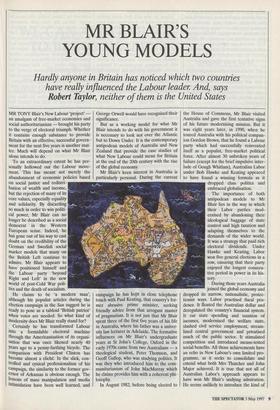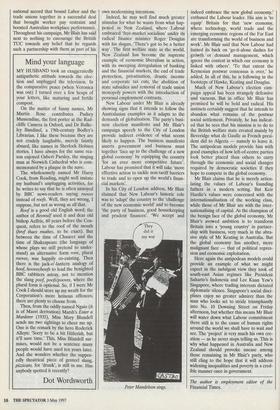MR BLAIR'S YOUNG MODELS
Hardly anyone in Britain has noticed which two countries have really influenced the Labour leader. And, says Robert Taylor, neither of them is the United States MR TONY Blair's New Labour 'project' an amalgam of free-market economics and social authoritarianism — brought his party to the verge of electoral triumph. Whether it contains enough substance to provide Britain with an effective, successful govern- ment for the next five years is another mat- ter. Much will depend on what Mr Blair alone intends to do.
To an extraordinary extent he has per- sonally hollowed out the Labour move- ment. This has meant not merely the abandonment of economic policies based on social justice and redistri- bution of wealth and income, but the rejection of many of its core values, especially equality and solidarity. By discarding so much in order to win politi- cal power, Mr Blair can no longer be described as a social democrat in the Western European sense. Indeed, he has gone out of his way to cast doubt on the credibility of the German and Swedish social market models that many on the British Left continue to admire. Mr Blair appears to have positioned himself and the Labour party 'beyond Right and Left' in the new world of post-Cold War poli- ties and the death of socialism.
He claims to be 'a modern man', although his populist articles during the election campaign in the Sun suggest he is ready to pose as a tabloid 'British patriot' when votes are needed. So what kind of modernity does Mr Blair really stand for?
Certainly he has transformed Labour Into a formidable electoral machine through the Americanisation of its organi- sation that was once likened nearly 40 Years ago to a penny-farthing bicycle. The comparison with President Clinton has become almost a cliché. In the slick, con- trolled and cynical professionalism of his campaign, the similarity to the former gov- ernor of Arkansas is obvious enough. The lessons of mass manipulation and media intimidation have been well learned, and George Orwell would have recognised their significance.
But as a working model for what Mr Blair intends to do with his government it is necessary to look not over the Atlantic but to Down Under. It is the contemporary antipodean models of Australia and New Zealand that provide the case studies of what New Labour could mean for Britain at the end of the 20th century with the rise of the global economy.
Mr Blair's keen interest in Australia is particularly personal. During the current campaign he has kept in close telephone touch with Paul Keating, that country's for- mer abrasive prime minister, seeking friendly advice from that arrogant master of pragmatism. It is not just that Mr Blair spent three of the first five years of his life in Australia, where his father was a univer- sity law lecturer in Adelaide. The formative influences on Mr Blair's undergraduate years at St John's College, Oxford in the early 1970s came from two Australians — a theological student, Peter Thomson, and Geoff Gallop, who was studying politics. It was they who introduced him to the corn- munitarianism of John MacMurray which he claims provides him with a coherent phi- losophy.
In August 1982, before being elected to the House of Commons, Mr Blair visited Australia and gave the first tentative signs of his future modernising mission. But it was eight years later, in 1990, when he toured Australia with his political compan- ion Gordon Brown, that he found a Labour party which had successfully reinvented itself as a populist, free-market political force. After almost 30 unbroken years of failure (except for the brief impulsive inter- lude of Gough Whitlam), Australian Labor under Bob Hawke and Keating appeared to have found a winning formula as it dropped class politics and embraced globalisation.
The importance of both antipodean models to Mr Blair lies in the way in which their Labor parties mod- ernised by abandoning their ideological baggage of state control and high taxation and adapting themselves to the demands of the wider world. It was a strategy that paid rich electoral dividends. Under Hawke and Keating, Labor won five general elections in a row, ensuring that their party enjoyed the longest consecu- tive period in power in its his- tory.
During those years Australia joined the global economy and dropped its narrow, nationalistic, protec- tionist ways. Labor practised fiscal pru- dence. It floated the Australian dollar and deregulated the country's financial system. It cut state spending and taxation of incomes, modernised the welfare state, slashed civil service employment, stream- lined central government and privatised much of the public sector. It stimulated competition and introduced means-tested social benefits. All those achievements have an echo in New Labour's own limited pro- gramme, as it seeks to consolidate and extend what both Mrs Thatcher and John Major achieved. It is true that not all of Australian Labor's approach appears to have won Mr Blair's undying admiration. He seems unlikely to introduce the kind of national accord that bound Labor and the trade unions together in a successful deal that brought worker pay restraint and boosted Australian workplace performance. Throughout his campaign, Mr Blair has said next to nothing to encourage the British TUC towards any belief that he regards such a partnership with them as part of his own modernising intentions.
Indeed, he may well find much greater stimulus for what he wants from what hap- pened in New Zealand, where Labour embraced `free-market socialism' under its radical finance minister Roger Douglas with his slogan, 'There's got to be a better way'. The first welfare state in the world, New Zealand has become the supreme example of economic liberalism in action, with its sweeping deregulation of banking and the financial markets, the end of trade protection, privatisation, drastic income and corporate tax cuts, the abolition of state subsidies and removal of trade union monopoly powers with the introduction of personal employment contracts.
New Labour under Mr Blair is already showing signs that it intends to follow the Australasian examples as it adapts to the demands of globalisation. The party's busi- ness election manifesto and Mr Blair's campaign speech to the City of London provide indirect evidence of what seems likely to happen. The business manifesto asserts government and business must together 'face up to the challenge of a new global economy' by equipping the country `for an ever more competitive future'. Labour has promised that it will take 'more effective action to tackle non-tariff barriers to trade and to open up the world's finan- cial markets'.
In his City of London address, Mr Blair claimed that New Labour's historic role was to 'adapt' the country to the 'challenge of the new economic world' and to become `the party of business, good housekeeping and prudent finances'. 'We accept and Peter Mandelson sings. indeed embrace the new global economy,' enthused the Labour leader. His aim is 'to equip' Britain for that 'new economy, where technology, world trade and the emerging economic regions of the Far East are transforming the world of business and work'. Mr Blair said that New Labour had turned its back on `go-it-alone dashes for growth or demand management, which ignore the context in which our economy is linked with others'. 'To that extent the Keynesian postwar consensus is over,' he added. In all of this, he is following in the footsteps of Hawke, Keating and Douglas.
Much of New Labour's election cam- paign appeal has been strangely defensive and vacuous. But in office Mr Blair has promised he will be bold and radical. His instincts certainly suggest that he intends to abandon what remains of the postwar social settlement. Privately, he has indicat- ed that he sees that his mission is to do to the British welfare state created mainly by Beveridge what de Gaulle as French presi- dent did to Algeria — namely to leave it. The antipodean models provide him with good examples of how left-of-centre parties look better placed than others to carry through the economic and social changes required by democratic societies if they hope to compete in the global economy.
Mr Blair claims that he is merely articu- lating the values of Labour's founding fathers in a modern setting. But Keir Hardie's values were concerned with the internationalisation of the working class, while those of Mr Blair are with the inter- nationalising of capital. As the champion of the benign face of the global economy, Mr Blair's avowed ambition is to transform Britain into a 'young country' in partner- ship with business, very much in the abra- sive style of Mr Keating in Australia. But the global economy has another, more malignant face — that of political repres- sion and economic exploitation.
Here again the antipodean models could provide an example of what we might expect in the indulgent view they took of south-east Asian regimes like President Suharto's Indonesia and Lee Kuan Yew's Singapore, where trading interests dictated diplomatic silence. Singapore's social disci- plines enjoy no greater admirer than the man who looks set to stride triumphantly into No. 10 Downing Street on Friday afternoon, but whether this means Mr Blair will water down what Labour commitment there still is to the cause of human rights around the world we shall have to wait and see. The 'project' is very much his own cre- ation — as he never stops telling us. This is why what happened in Australia and New Zealand should provoke unease among those remaining in Mr Blair's party, who still cling to the hope that it will address widening inequalities and poverty in a cred- ible manner once in government.
The author is employment editor of the Financial Times.



































































 Previous page
Previous page